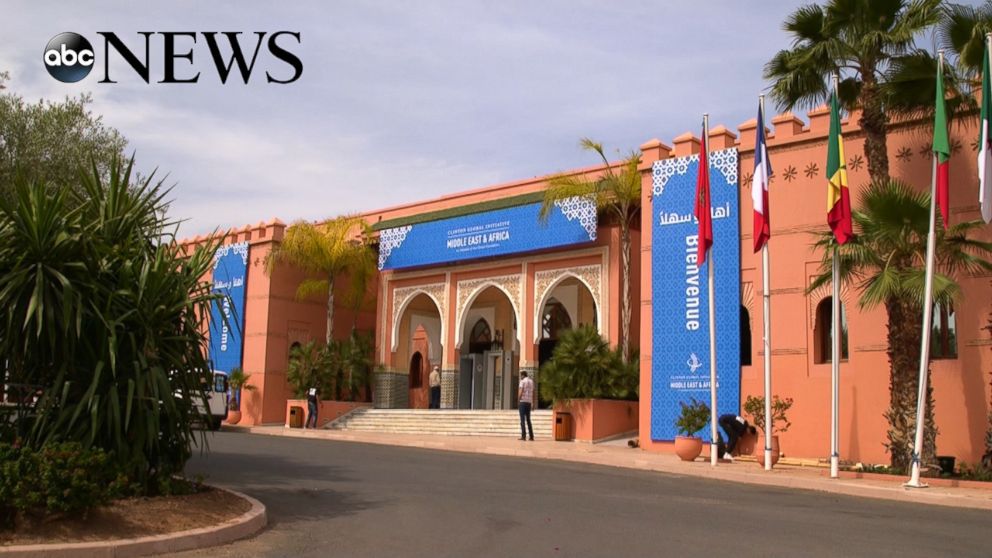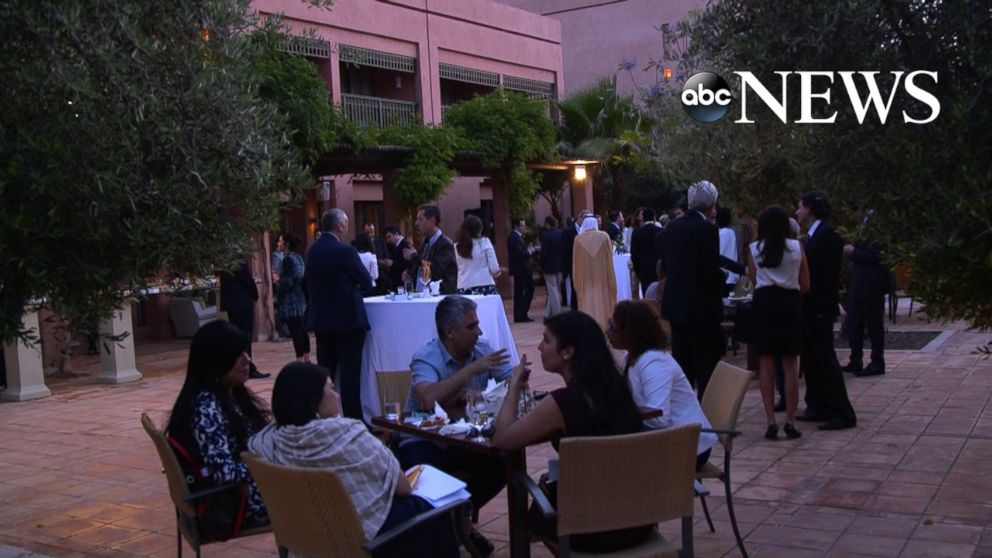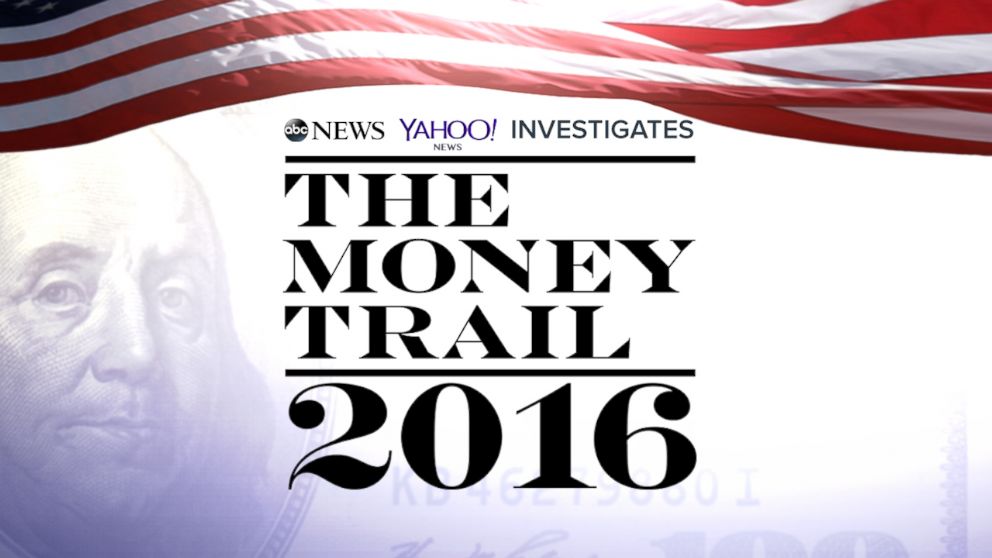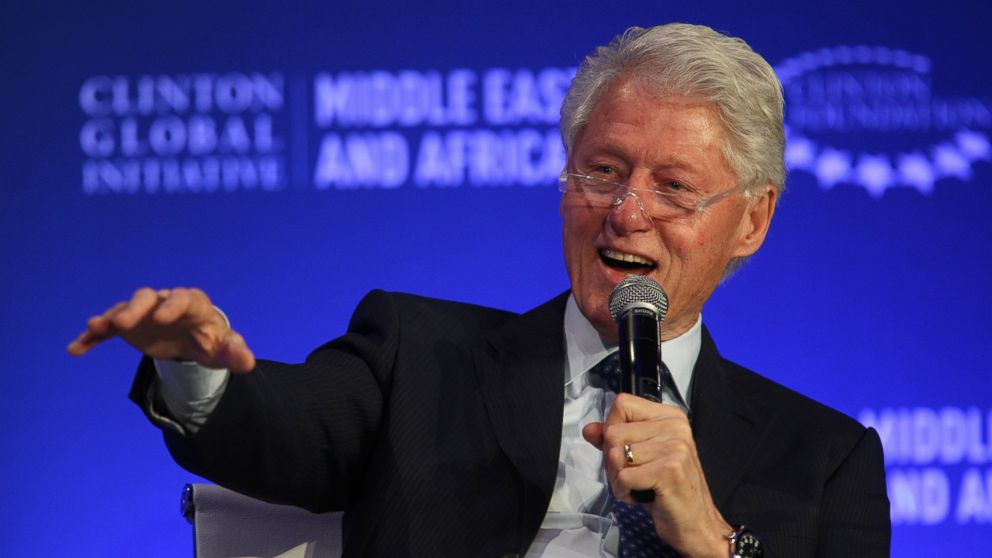Clinton Foundation Taking Money From Accused Rights Violator
MARRAKECH, Morocco— -- [This story is the first in a series of joint Money Trail investigations by ABC News and Yahoo News that will appear during the 2016 presidential campaign cycle.]
Former president Bill Clinton and the Clinton Foundation’s Global Initiative are being hosted this week at a five-star luxury hotel in Morocco by one of the world's most controversial mining companies, criticized for "serious human rights violations" by the Robert F. Kennedy Center for Justice.
The Moroccan government-owned mining company OCP operates in disputed international territory in a remote part of the Saharan Desert and the firm has been criticized for removing the resources without adequately compensating the impoverished people who live there.
“Any time the human rights of a population are systematically suppressed in this type of way it's a serious concern, and I think it's worthy of attention,” said David McKean, who has studied the issue for the RFK center.
OCP is paying $1 million to help host the prestigious event and throw a private cocktail reception, to the dismay of human rights activists.

See more of the report tonight on "World News With David Muir".
When thanking Morocco for its hospitality, the former American president heralded the country's potential, proclaiming that it is "the Saudi Arabia of Phosphate."
The reported $1 million donation is the latest to raise questions about the Clinton Foundation’s heavy reliance on foreign and corporate donors at a time when Hillary Clinton has launched a bid for president.
In his opening remarks, the former president dismissed the controversy over foreign donations, shrugging, "I just work here."
Until just a few weeks ago, Hillary Clinton was listed on the foundation website as a "host" of the Moroccan event and critics see this week's meeting as another vehicle for well-heeled foreign interests to gain access and curry favor in Washington.
OCP officials told ABC News their motives in sponsoring the event had nothing to do with any interest in access to a presidential candidate or her famous husband.
“The Clinton Global Initiative, we share their goals,” said Talal Zouaoui, an OCP spokesman. “This is why we’re here.”
But the company has sought greater influence in Washington. Government records reviewed by Yahoo News and ABC News show that OCP has sharply accelerated its lobbying of U.S. government officials in recent years -- more than quadrupling its spending -- as the Moroccan government was pressing its case for sovereignty over Western Sahara, the disputed international territory where the company's main phosphate mine is located.
OCP, the records show, has paid Covington & Burling, a top Washington law firm, $1.3 million since 2012 to lobby the State Department and other federal agencies. The mining company's CEO, Mostafa Terrab, who attended and was scheduled to speak at the Clinton Foundation event here, has also registered with the Justice Department as a foreign agent for Morocco to help "plan and prepare" meetings with Obama administration officials. One Moroccan government-backed entity last year also hired a firm headed by Washington lobbyist Justin Gray -- putting his firm on a $25,000 a month retainer -- the same month he was named a board member of the pro-Hillary Clinton super-PAC, Priorities USA. A spokesperson for Gray said the lobbyist had done previous work for the Moroccan government and that his current "engagement is not related in any way to [his] role with Priorities USA action."

Questions that began to emerge with the recent publication of the book, Clinton Cash, suggest a range of foreign interests have donated tens of millions to the foundation over the years in an effort to curry favor with the Clintons.
Responding to criticism about its fundraising, the Clinton Foundation and its various entities have sharply curtailed foreign fundraising, limited those efforts to a handful of countries. And the foundation has pushed back sharply against the accusations, calling them groundless conspiracy theories.
In response to questions about the OCP donation, a Clinton foundation spokesman told ABC News the money helps promote the organization's good work.
"Our sponsors made it possible for hundreds of CGI members to come together in Morocco to launch new programs designed to help hundreds of thousands of people," the statement said.
Despite the swirling controversy, the three-day conference in Morocco, long in the works, went ahead as scheduled this week. Held in an oasis of golf greens and palm trees secluded from the din and packed crowds of the exotic Marrakech central square, several dozen top Clinton Foundation members were scheduled to spend three uninterrupted days of panel discussions, breakout sessions and opportunities to speak with President Clinton and an assortment of world leaders. Among other sponsors of the event are the Akwa Group, a Moroccan oil and gas firm, Channel IT, a Nigerian telecom company, and Coca-Cola and APCO Worldwide, one of Washington's biggest lobbying firms which has long provided public relations services for the Clinton Foundation, free of charge.
Many of the foundation’s top donors arrived at the manicured Palmeraie Palace after several days traveling as part of Bill and Chelsea Clinton’s entourage on a tour to highlight the foundation’s good work in Africa. The former president brought network news crews on part of the journey to put the best of the foundation’s efforts on display.
During the conference’s opening session, Clinton brushed off recent criticism of the Clinton Foundation.
“There’s one set of rules for politics and another one for real life and you just have to learn to deal with it,” he said.
Clinton used his speech to tout the success of the foundation and the related Clinton Global Initiative have had helping corporate and individual donors pair up with those in need. He described, for instance, an effort to get solar-powered refrigerators to a remote Tanzanian village so the villagers could maintain a store of vaccines for children there.

Clinton Foundation officials have taken a number of steps in recent weeks to try and burnish their image as transparent –- promising to reveal the names of donors that the foundation said it inadvertently failed to disclose. That public relations offensive was apparent at the heavily-guarded resort in Marrakech. The policy discussions that made up the bulk of the conference schedule were open to the media to attend. The foundation took the rare step of also opening a “networking” cocktail party, where donors, charity workers and foreign leaders mingled over fine wine and Moroccan finger food. Clinton did not attend that event.
But the private reception scheduled for Wednesday night, to be hosted by OCP at different luxury hotel on a thoroughbred horse farm, was identified as off limits to press.
Company officials told ABC News that OCP has been unfairly maligned by critics. In fact, they said the majority state-owned mining business re-invests money made in Western Sahara back into the region. And the executives said their involvement in the Clinton Foundation was intended to help make phosphate-based fertilizer available to needy farmers in Africa –- work the foundation has helped make possible.
“We have good spots and bad spots, and when we have a bad spot we try and improve it as much as we can,” said Zouaoui, the company spokesman. “That’s all I can say, I guess.”
In a statement, the company added that it shares "the Clinton Foundation’s commitment to promoting inclusive, sustainable development, including their support of African farmers, and are proud that Morocco is hosting the first convening of the Clinton Global Initiative Middle East and Africa."
But critics said the company’s donation -– first reported by Politico –- and it’s track record on human rights should have put foundation officials on edge.
Rep. Joseph R. Pitts, a Pennsylvania Republican who co-chairs the congressional Human Rights Commission and oversees the Subcommittee on Africa, Global Health and Global Human Rights, said he was deeply troubled that the Clinton Foundation would accept such a large sponsorship donation from the Moroccan mining concern.
“They're extracting a natural resource phosphates, making millions of dollars off of it... and taking from the people of Western Sahara who are repressed who are living as refugees, tens of thousands of them,” Pitts told ABC News. “It's really an egregious violation of the principles of human rights, to use the profits, taken from these people, their territory, to fund a group of one-percent-ers.”
[This report was updated May 7, 2015.]





